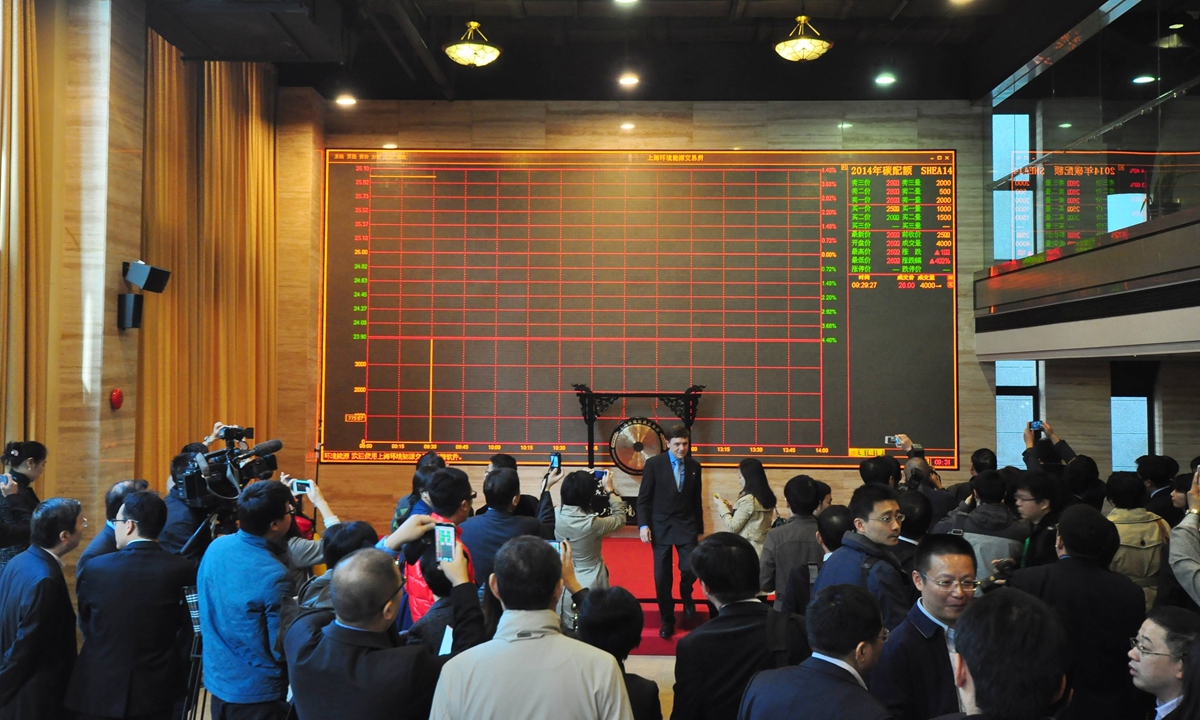Xi to address Climate Ambition Summit
By Xie Wenting and Shan Jie Source: Global Times Published: 2020/12/11 22:33:41
Vital for China, US to reboot carbon emission cooperation

File photo: Shanghai carbon-market emissions trading scheme pilot launches trial at the Shanghai Environment and Energy Exchange on November 26, 2013. Around 191 companies from industries including steel, chemical production, service and aviation took part in the trials between 2013 to 2015. Photo: Xinhua
Chinese President Xi Jinping is scheduled to participate in the 2020 Climate Ambition Summit and deliver an important speech via video on Saturday - which marks the fifth anniversary of the Paris Accord. Experts told the Global Times on Friday that China, the world's most ambitious leader on climate change, will demonstrate its aspiring and progressive chart in carbon reduction at the ambition summit.
Experts believe this will send a strong signal to the world of China's unswerving commitment to serving as a role model in addressing the grave global climate challenges.
They pointed out that including "ambition" into the name of the UN climate summit for the first time showed the urgent need for more active and practical measures to reach a more ambitious goal than that was set by the Paris Accord, and China which has voluntarily set a stricter target by pledging to realize carbon neutrality by 2060 is the world's ambitious leading force.
On Saturday, the virtual Climate Ambition Summit 2020 hosted by the UN, France and the UK, in partnership with Italy and Chile aims to serve as a platform for government and non-government leaders to demonstrate their strong will to the Paris agreement.
China's ambition on carbon emission reduction is to hit peak emissions before 2030 and achieve carbon neutrality by 2060 - an ambitious and progressive goal hailed by environmentalists, Ma Jun, director of the Beijing-based Institute of Public and Environmental Affairs, told the Global Times on Friday.
The original target set by the Paris Accord is to keep the increase in the global temperature below 2 C, and later some proposed to change it to 1.5 C. But this seems far from enough and needs more ambitious goals, Ma said.
Li Haidong, a professor at the Institute of International Relations of the China Foreign Affairs University, told the Global Times on Friday that Xi may pledge accurate goals and figures, such as the proportion of the use of clean energy in China, at Saturday's summit.
"Unlike the US, which led the world by demanding others to follow its own rules, China is leading by honoring its promises and becoming a role model in the climate change field," Li said.
While the Trump administration is unlikely to participate at Saturday's summit, several experts reached by the Global Times pointed out cooperation between China and the US - the world's two largest emitters - under the Biden administration will make climate change a core agenda despite fraying bilateral ties.
While the Trump administration pulled out of the Paris climate agreement, US President-elect Joe Biden made clear that he world lead the country back to the accord which is also viewed as Barack Obama's legacy. Biden also pledged to achieve carbon neutrality by 2050.

Photo:VCG
Ma told the Global Times that it is vital and possible for China and the US to reboot the climate cooperation. The Trump administration's withdrawal from the Paris Accord obstructed the country-level communication on climate. While some communications at the grassroots NGOs, companies and governments at city and federal levels between the two sides are still underway, they are far from enough to address the climate challenges, he said.
To restart cooperation, Ma suggested on the one hand, both countries can provide more support to these NGOs and companies of both sides in the climate field to accelerate in-depth communications which could help the reboot of communications at the state level.
Meanwhile, both countries can start climate diplomacy on multilateral platforms first such as tapping on the climate topic at some international meetings, and when things get mature, they can move further to the bilateral level, Ma suggested.
Todd Stern, who once served as the United States Special Envoy for Climate Change, wrote in an article on the Brookings Institution's website in September when the presidential result was still unclear, that Biden's administration "needs to send the right signal early on to reboot climate cooperation with China."
"Biden will also plan a summit with Xi in his first year. The agenda for their meetings will be crowded, but climate change will need to be a featured topic, to convey that Biden is serious about it and to provide the time they'll need for meaningful discussion," he wrote.
But he also predicted that it will not be easy for this cooperation in light of the deteriorating "overall relationship and the evolving landscape of the climate challenge."
Li said that even though the room for both countries to cooperate on climate exists, Biden's ambition may see constraints from Congress.
Li Shuo, Senior Policy Advisor at Greenpeace East Asia, told the Global Times on Friday that five years ago, a series of intense climate diplomacy between the two countries helped unlock the Paris climate deal, but things have changed a lot since then as relations between the US and China have hit rock bottom.
"The Biden administration may also employ more competitive rhetoric when approaching its climate engagement with China," he said.
However, despite these profound shifts, two things remain unchanged. "First, China and the US need to embrace much stronger climate ambitions than they currently do. Second, climate change is still one of the rare areas where the political interests of China and the US perfectly align. With changing geopolitics, a somewhat positive climate dynamic between the two cannot be simply assumed, but should be painstakingly earned," he said.
Ma agrees that the possibility of having confrontations on climate cooperation is high as it is related to the interests of both sides, and also the increasingly hostile political environment.
"Both sides need to learn to manage their differences amid a rivalry on climate," he said.